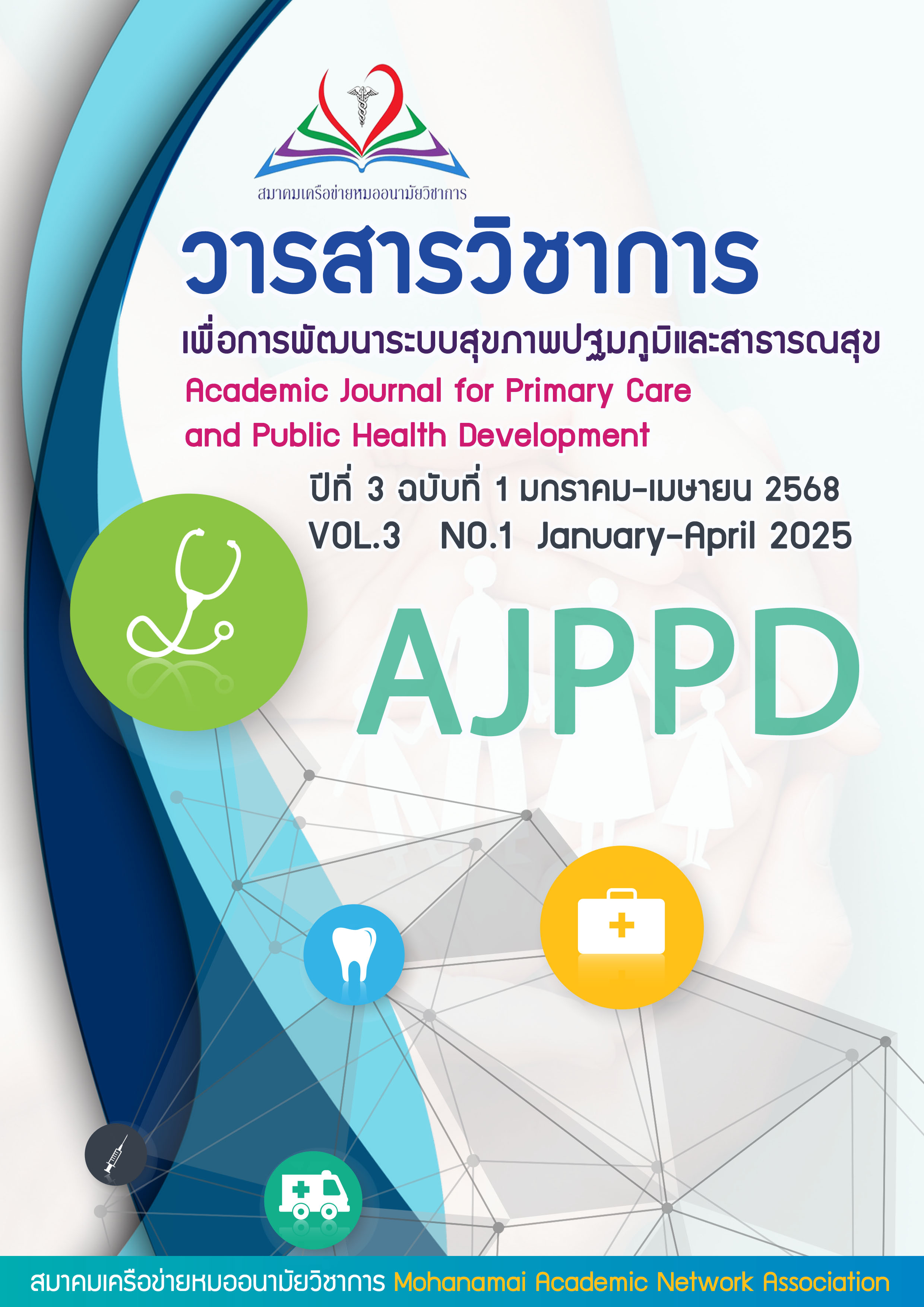Development of a model to caring for patients with hypertension In the area of responsibility of the Primary and Holistic care Department, Sribanpot Hospital Phatthalung Province
Keywords:
Patient Care Model Development, Hypertension Management, Participatory Action ResearchAbstract
This study was a Participatory Action Research aimed at developing and evaluating a care model for hypertensive patients in the primary care service area of Sribanpot Hospital, Phatthalung Province. The research was conducted from December 2023 to February 2024, divided into three phases: 1) situation assessment, 2) model development with three action cycles, and 3) evaluation. Participants included 25 key informants (hypertensive patients, village health volunteers, professional nurses, and a multidisciplinary healthcare team) and collected data from 163 hypertensive patients. Research instruments included knowledge, attitude, and self-care behavior assessments. Quantitative data were analyzed using descriptive statistics and t-test, while qualitative data were analyzed using content analysis with participant involvement.
The results revealed that the developed care model comprised six components: 1) initial assessment, 2) medication management, 3) education and support, 4) complication prevention, 5) lifestyle modification, and 6) follow-up monitoring. After implementation, patients showed statistically significant improvements in knowledge (t=-3.547, p=0.003), attitudes (t=-3.124, p=0.004), and overall self-care behaviors (t=-5.128, p=0.001). Additionally, both systolic and diastolic blood pressure levels decreased significantly (t=7.36, p=0.002 and t=9.23, p=0.001, respectively). Patient satisfaction with the care model was high (90.80%). This developed model can serve as a practical guideline for hypertension management in similar primary care settings.
References
จารุณี นุ่มพูล. (2563). การประยุกต์ทฤษฎีขั้นการเปลี่ยนแปลงพฤติกรรมในผู้ป่วยกลุ่มอาการเมแทบอลิกวัยผู้ใหญ่. วารสารพยาบาลสภากาชาดไทย, 13(2), 15-28.
วนิดา สาดตระกูลวัฒนา. (2561). การพัฒนารูปแบบการจัดบริการคลินิกโรคเรื้อรัง (เบาหวาน, ความดันโลหิตสูง) ในหน่วยบริการปฐมภูมิ อำเภอเมือง จังหวัดสิงห์บุรี. วารสารสมาคมเวชศาสตร์ป้องกันแห่งประเทศไทย, 8(1), 24-36.
วีรยุทธ ศรีทุมสุข และคณะ. (2563). ปัจจัยทำนายความต้องการของผู้ดูแลผู้ป่วยโรคหลอดเลือดสมองระยะหลังเฉียบพลันรายใหม่. วารสารพยาบาลสภากาชาดไทย, 13(2), 144-158.
สำนักงานสาธารณสุขจังหวัดพัทลุง. (2566). ฐานข้อมูลผู้ป่วยโรคไม่ติดต่อเรื้อรัง. สืบค้นเมื่อ 1 พฤศจิกายน 2566 จาก https://plg.hdc.moph.go.th/hdc/reports/report.php?cat_id
สำนักโรคไม่ติดต่อ กรมควบคุมโรค กระทรวงสาธารณสุข. (2560). แผนยุทธศาสตร์การป้องกันและควบคุมโรคไม่ติดต่อระดับชาติ 5 ปี (พ.ศ. 2560 - 2564) (พิมพ์ครั้งที่ 1). กรุงเทพฯ: บริษัทอิโมชั่น อาร์ต จำกัด.
Bearman, K. J., & La Greca, A. M. (2002). Assessing friend support of adolescents' diabetes care: The Diabetes Social Support questionnaire-Friends version. Journal of Pediatric Psychology, 27(5), 417-428. https://doi.org/10.1093/jpepsy/27.5.417
Freire, P. (1996). Pedagogy of the oppressed (Revised ed.). New York: Continuum.
Gibson, C. H. (1991). A concept analysis of empowerment. Journal of Advanced Nursing, 16(3), 354-361. https://doi.org/10.1111/j.1365-2648.1991.tb01660.x
Kolb, D. A., Osland, J., & Rubin, I. M. (1991). Organizational behavior: An experiential approach. Englewood Cliffs, NJ: Prentice-Hall.
World Health Organization. (2023). Global status report on non-communicable diseases. Retrieved from https://www.who.int/news-room/fact-sheets/detail/noncommunicable-diseases

Downloads
Published
How to Cite
Issue
Section
License

This work is licensed under a Creative Commons Attribution-NonCommercial-NoDerivatives 4.0 International License.





